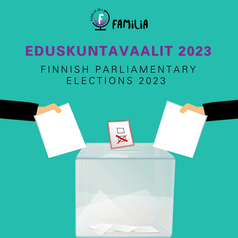|
|
|
Familia's objectives for the 2023-2027 government programme -
Main Points
|
1. A possibility to register several mother tongues in the Population Information System
Propositions:
2. The processing of residence permits based on family reunification must be accelerated, and the realization of the child's rights must be prioritized in the residence permit process. D visa shall be possible also due to family ties.
Propositions:
3. The maternity package must be granted to all families with at least one parent covered by Finnish social security. At the same time, the name of the package must be changed.
Propositions:
4. The national curriculum should be updated in the next term of government, and the teaching of one's own mother tongue should be added to the curriculum.
Propositions:
5. Finland must be a good country for everyone to live in – promoting good relations between population groups should be at the heart of integration.
Propositions:
6. Employment must be made receptive to all people with a migrant background.
Propositions:
7. Putting anti-racism at the center – the impact of racism and discrimination must be recognized in all areas of society.
Propositions:
Explanation
The effects of racism are often deeper than we think. Experiences of racism have a broad impact on a person's well-being, and many young people feel that racism has affected their identity and mental health even many years after exposure to racism. If a person repeatedly encounters racism, it can cause chronic stress, which can lead to both psychological and physiological symptoms. It is therefore important to focus on the prevention of racism and discrimination at all levels of society to improve well-being. It is particularly important that there is a commitment to anti-racist practices at the state level, also because discrimination and negative experiences make integration into the country more difficult. The most important means of preventing racism are education and access to information. The attitudes of young people must be actively influenced from early childhood education, by addressing racism continuously, not only in isolated, actual cases. Additional training for anti-racism work is especially needed in early childhood education, where those who work with children play a major role in dispelling societal prejudices and creating a more equal atmosphere. A stronger emphasis on anti-racism is necessary in the national curriculum, particularly because the matters recorded in the curriculum also guide the Board of Education's resources and project funding. Additionally, emphasis on anti-racism must be put in the education of public sector professionals who are in contact with people from different backgrounds, such as police, health care, and social workers. An essential part of politics is also raising issues in public and social debate. Hiding racist behaviors and structures does not eliminate them, but shifts the responsibility for racism to the person who experiences it. Issues of racism must be more extensively raised in public debate, and racist hate-speech in public discourse needs to be tackled more firmly. Political decision-makers and authorities must also lower the threshold for reporting experienced racism and discrimination, and people handling reports must be trained to act fairly in such situations. The complainant about racism should feel that he or she is being listened to and cared for, and that the issues are addressed properly. |



